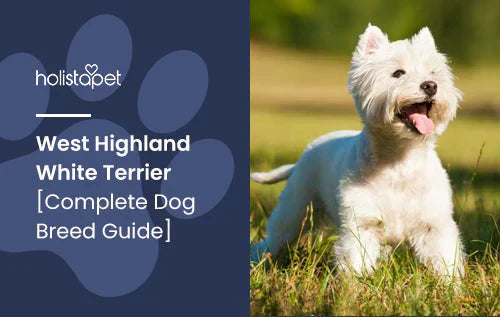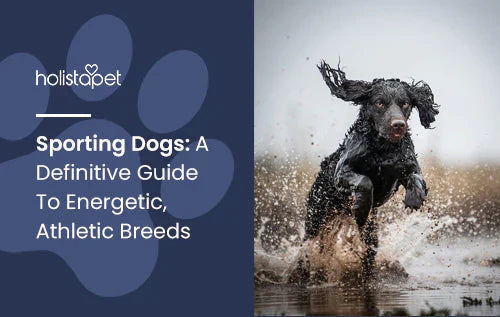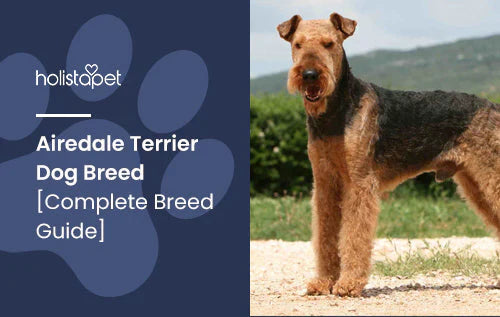Although small and nonthreatening looking, the West Highland White Terrier is a breed that packs plenty of personality in a tiny package! Originally from Scotland, West Highland White Terriers are known for their elegant white coat, playful personality, and friendliness. Westies are extremely smart and always willing to please, which makes them great family pets!
Affectionately known as Westies, this dog breed is full of energy, enjoy spending time with people, and sometimes chase after small rodents. Let's take a closer look at the West Highland Terrier, their characteristics, personality, breed history, and much more!
Characteristics
The West Highland Terrier is a small, well-balanced dog breed that has all the physical characteristics of the Terrier dog category. West Highland dogs are strongly built with a deep-in chest and back ribs. They also have powerful hindquarters, which provide a full range of motion and surprising strength.
The Westie is a compact dog but maintains a balanced body that is excellent for hunting small rodents and other physical activities. Its forequarters are well built and well-knit to the backbone. The chocolate brown westie hindquarters are relatively short yet muscular.
White Terriers temperament should have a proportionate head to the body. A Westie's expression is inquisitive and piercing, with medium-sized eyes set widely apart from each other. The ears are small and usually stand erect. Their muzzles are blunt and slightly shorter than the skull, capped off with a large and powerful black nose. The lifespan of a West Highland Terrier is between 12 and 16 years.
Dog Breed Size
The West Highland White Terrier is a compact yet sturdy dog with a deep chest and slightly rectangular shape. Male Westies can grow up to about 11 inches tall, and female Westies can grow up to 10 inches tall. Male Westies typically weigh 15-22 lbs, and females usually weigh somewhere between 13-16 lbs.

Westie Personality
The West Highland Terrier Cesar dog is a fun-loving, charismatic, bold dog with a contagious smile. Westies love playing with their owners, squeaky toys, being affectionate, and spreading good vibes throughout the family. At times, the Highland White Terrier can be mischievous and play pranks on people, but they do so in a loving manner that's all in good fun.
Westies are incredibly friendly and easily get along with everyone in the family. Although a West Highland enjoys being a part of the family, they are not much of a lapdog. The way they show their affection is by hanging out with you on the opposite side of the couch while you're watching TV.
West Highland Terriers are naturally smart and rather curious. Frequently you may find them outside trying to capture small rodents, or they may do some excavating in your backyard, digging up holes. With their Terrier side, Westies are a bit spunky and show a bit of attitude when needed. They rarely start fights, but they will never turn down a chance to tackle a new challenge. Along with this grit, they also enjoy going on adventures, car rides, and exploring new places with you.
Dog Breed Exercise
For being a small-sized dog, West Highland Terriers are a giant ball of energy. Westies love to romp and play and enjoy going on a nice walk. Although Westies do not look threatening, they are still natural hunters and will chase after anything that moves. You should keep them on a leash or in a safely fenced area, so they don't run away.
Because of their spunky and energetic personality, Westies are fantastic in various canine sports and activities such as obedience, rally, and agility. Westies are also naturally great at Earthdog or hunting events.

Training
West Highland Terrier dogs are very sharp and confident, making them quite a treat to train. Westies tend to be very independent and are usually bred to work alone. Sometimes this can cause some arrogance, but Westies are otherwise responsive to your training demands for the most part.
Westies can learn just about anything from tricks to not barking and many other things with a bit of patience and consistency. One of the key things to training any dog is to start when they are still a puppy. By starting early, they can get used to the behavior you want them to learn and carry it into adulthood.
Like with any other breed, socialization is a critical part of a dog's upbringing. Experience and exposure to new sights, sounds, and people are important for building confidence in your dog. A well-socialized dog is better prepared to deal with unfamiliar situations and get along with new people and other dogs!
Related: How to Socialize a Dog No Matter the Age, Breed or Aggression Level
Dog Breed History
The West Highland Terrier has an extensive history that dates back to the King James I era in the early 1600s. The Westie was originally known as the dogs of Argyleshire. However, later on in the 1800s, Colonel Malcolm of Poltalloch further established the breed and adopted the name of Poltalloch Terrier.
According to breed lore, the white coat of the Westie resulted from a tragic hunting accident. When Colonel Malcolm of Poltalloch was out hunting foxes, he accidentally shot and killed one of his wheaten-colored Cairn Terriers. Ever since this incident, the Colonel decided to only breed white-coated dogs so they would not be mistaken for foxes.
The history of the West Highland Terrier shares many similarities to several breeds such as the Dandie Dinmont, Skye, Scottish, and Cairn Terriers. They originated in Scotland and were mostly used for hunting foxes, badgers, and other vermin. Even today, the West Highland breed is known to chase down anything small creature that moves.
The West Highland Terrier has had a few different names, such as the Poltalloch Terrier and the Roseneath Terrier. In 1906, the breed was finally recognized by the Kennel Club of England as the West Highland Terrier.

Common Health Problems in the West Highland Terrier
As with any dog breed, certain health problems may arise. Although West Highland Terriers are generally healthy, some of these problems that can still show up. Some of these health issues can be resolved by home remedies, but others can potentially be serious, and you should seek medical attention.
Craniomandibular Osteopathy
Craniomandibular osteopathy is a rare condition that affects the skull bones when a puppy is still growing. This condition occurs when the skull grows irregularly large. Symptoms can appear anywhere between 4-8 months of age. The cause of craniomandibular osteopathy is unknown, but it is mostly hereditary.
With this condition, the puppy's jaw and glands become swollen, making it difficult to open their mouth. Because of this, there is an excess drool, fluctuating fevers, and in some cases, their chewing muscles may atrophy and die. Unfortunately, there is no cure for craniomandibular osteopathy. Some medicine can help ease the pain and relieve the jaw muscles. However, one of the most important things is making sure your dog gets the proper nutrition it needs, even if that means you need to use a feeding tube.
The irregular bone growth typically slows down by the time the puppy is one year old. There are very few cases that are severe enough where jaw surgery is necessary. One of the best ways to help your Westie is by taking your dog to the vet and seeing what medication they recommend!
Legg-Calve-Perthes Disease
Legg-Calve-Perthes Disease is a condition in which the blood supply to your dog's head of the femur is decreased. When this occurs, the part of the femur that connects to the pelvis begins to disintegrate and can lead to significant pain. Some of the first signs of LCPD are limping and weak leg muscles. This condition usually occurs when your Westie is still a puppy (about 4-6 months old).
In milder cases, pain medication may be enough to manage the condition. However, if the condition worsens, you may have to take your dog to the vet for hip replacement surgery. After surgery, your dog will need plenty of physical therapy and medication to fully recover.

Cataracts
Cataracts are an eye condition that results in your dog having a difficult time seeing. With cataracts, your dog's eyes will have a cloudy or hazy appearance and can lead to full blindness. This condition usually occurs in older dogs and can be corrected through surgery, potentially improving your dog's vision. Westies are prone to having cataracts earlier than other breeds, so remember to get their eyes checked regularly.
Pulmonary Fibrosis
Pulmonary fibrosis is a lung disease that affects the supporting tissue in the lungs' air sacs and connective tissue. This condition has a particularly higher chance of affecting Westies. Pulmonary fibrosis prevents oxygen from passing normally into the blood. Dogs can show several symptoms if they're affected by this condition. Symptoms include loss of stamina, rapid breathing, dry cough, and difficulty breathing. Pulmonary fibrosis is a serious condition that can potentially lead to heart failure and other serious diseases.
Unfortunately, there is no cure for this condition, and the prognosis is always poor. The best way to prevent any respiratory infections is to limit your dog's exercise and to keep them on a consistent and healthy dog treat diet. Early detection for this disease is crucial and can potentially be life-saving, so it is always a good idea to take your dog to the vet for regular checkups.
Patellar Luxation
Patellar luxation is a common problem that occurs in small dog breeds. This is a condition that occurs when the patella or the kneecap falls out of place. Patellar luxation most commonly occurs in smaller breeds. Symptoms of this condition can include pain, difficulty walking, or lameness in one or even both hind legs. In some cases, joint supplements or other medication can manage the condition and any discomfort.
In more severe cases, your dog may need surgery to repair the kneecap and reattach it. You might need to put your dog through physical therapy and a strict diet plan afterward for a full recovery.
How to Care for a West Highland Terrier
Westies are very adaptable dogs and can thrive in almost any living environment. They are small enough to happily live in an apartment provided that you take them on plenty of walks. They also thrive on large farms with plenty of land and rodents to chase after. As long as they have a decent amount of playtime and access to outdoor areas, they'll be happy.

It is important to always keep an eye on your Westie when they are outside because they will run off in a split second if they see a squirrel or another small creature. So make sure they are only allowed in a fenced yard or kept on a leash. West Highland Terriers can get some separation anxiety when you leave the house but will do fine if you leave some background noise such as the TV or radio to drown out the silence. When alone, they appreciate having access to plenty of toys to stay busy and active.
Westies love spending time with people and are little jokesters, always making the family laugh. Although they are not the best lapdog, they enjoy their owner's presence and appreciate any quality time you share with them.
Nutrition and Feeding for a West Highland Terrier
As with any dog breed, nutrition is extremely important, and a well-managed diet can prevent many health issues. For the West Highland Terrier, they should do well with high-quality dog food or home-prepared food. The recommended daily amount of food for your Westie is about 0.5-1.5 cups of dry food a day, divided into two meals.
Your dog's diet depends on a number of factors such as size, build, metabolism, and activity level. Some dogs can be picky eaters, so finding the right food that is nutritious and tastes good can be quite difficult. It is always best to check in with your vet to see what kind of dog food they recommend for your Westie to live a long and healthy life.
To maintain a healthy weight, you should not overfeed your dog and limit giving them too many treats. Westies are a rather active dog breed, so they can usually burn off those treats quickly. As a rule of thumb, try to minimize their treat intake when you are training them or for positive reinforcement.
Coat Color And Grooming
The West Highland Terrier has a double coat with a shorter undercoat and a topcoat about two inches longer than the undercoat. This double coat helps protect your Westie from harsh weather. It might also protect them from teeth and claws from animals they are trying to hunt.

As hinted in the name, the West Highland Terrier's coat color should always be white. Any other color is considered a fault within the show ring. A Westie's coat is easy to groom and does well with regular brushings and trimmings. Trimming around the feet and the facial features are the most necessary for upkeep because their hair can become shaggy. Westies typically do not shed, but brushing your dog's coat can help remove any loose hairs.
Because of their famous white coat, it is easy to spot when your Westie has gotten into some mischief. However, Westies only need to bathe once every few months because their coat has plenty of natural oils that can their skin healthy and rejuvenated. Always keep your Westie's nails trim so they do not sound like they are tap-dancing around your home. You can trim once every few weeks if they aren't already worn down from daily exercise and walks.
Since Westies love to chase after rodents and other little creatures in the yard, they may be prone to certain infections or parasites. Regularly check their ears for dirt, redness, and other signs that can lead to an infection. The best way to clean out their ears is to use a cotton ball with a small amount of vet-approved, pH-balanced ear cleaner.
Children And Other Pets
The West Highland Terrier's personality is perfect for young children. They are a perfect size where they are not overwhelming to play with and intelligent enough to know how to interact with small kids. Despite this, it is still recommended to always have adult supervision when your kids play with the family dog.
It is also important to teach your children how to properly interact with pets and treat them respectfully. Make sure your small kids are playing nicely with your Westie and do not pull on their tail, slam into them, or any other altercation that your Westie might not enjoy.

As for other dogs, the West Highland Terrier is well suited for living with other animals, especially other small dogs. Westies are not typically territorial, so that they can respect the presence of other dogs in the house. But it is always a good idea to train your Westie when they are young to socialize with other animals, so they do not practice any bad habits as an adult.
Westies are usually okay living with cats as long as they are a well-adjusted part of the family unit. However, smaller animals such as hamsters or guinea pigs should be wary because of the Westie's innate instinct to hunt small creatures. So if you have any small animals, always keep them in their cage or away from your Westie for their protection.

More About this Breed
The West Highland Terrier is an incredibly popular dog breed that you may have seen without realizing it. If you have been shopping for dog food and you find the small tinfoil packages of Cesar dog food, there is a smiling Westie right on the front. The Highland White Terrier Westie was also featured in a few films, such as 1992's Lethal Weapon 3, 2018's cult hit Game Night, and the 2018 thriller Widows.
On average, Westies cost about $1000 if you decide to buy from a breeder. Adopting can be considerably cheaper if that's the route you choose. No matter where you decided to get your very own Westie, remember to check their health history to ensure that your dog will grow up healthy and happy with no issues!


 CBD Oil for Dogs - Fast Acting
CBD Oil for Dogs - Fast Acting
 Chicken Flavored CBD Oil For Dogs - Easy Dose
Chicken Flavored CBD Oil For Dogs - Easy Dose
 Salmon Flavored CBD Oil For Dogs - Highly Rated
Salmon Flavored CBD Oil For Dogs - Highly Rated
 CBG Oil for Dogs and Cats - Loved by Thousands
CBG Oil for Dogs and Cats - Loved by Thousands





Leave a comment
All comments are moderated before being published.
This site is protected by hCaptcha and the hCaptcha Privacy Policy and Terms of Service apply.